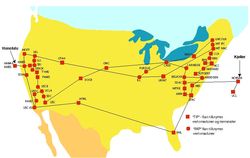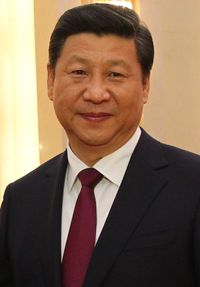
We wait for the market to create a need, and to create a leader. Then everyone else gangs up on the leader and creates what they call a standard.
Think of Betamax and VHS. Sony was the first mover, and the other manufacturers ganged up on it to take the consumer market. Or think of Apple and Microsoft in PC operating systems, where Microsoft, IBM, and their OEMs convinced most of the market to wait six full years for a working user interface Apple had introduced in 1984. The same thing is happening with Apple and Google in phones, although in this case Apple has managed to sponge off most of the profits and leave the OEMs toting Google’s laundry and holding the bag.
But there are areas of technology where that process doesn’t work, where only the government can create and enforce standards because the players are too selfish and diffuse to accomplish it themselves.
It’s why the Internet is the way it is. I was covering the story at the time it happened, so I know.

In the 1980s phone companies and equipment suppliers tried to create their own standards, like X.25 and X.400, sometimes even cooperating. But they fell out around the problem of how each company would assure it got paid for moving bits. On the Internet, by contrast, everyone was sucking the government teat and getting paid wasn’t an issue. So it was that, as networks expanded in the early 1990s, the non-discriminatory, connect-first Internet standards of the military were adapted to the commercial market by peering agreements.
This is the problem as we approach the Internet of Things. The Internet method of development, essentially a top-down demand that standards exist, is the right way to go here. And guess who has that?

The primary result of all this work has been standards. Standards for appliances, for wearable medical technology, for smart cars, standards that are already being built into things like power strips and light bulbs. Since China is already the global technology manufacturing center, thanks to cheap labor and an investment climate that let chip companies get their money out, and more, in exchange for trade secrets, companies like Alibaba can use these emerging standards to solve real problems.

As I’ve written for some time now, the purpose of the Internet of Things isn’t “things.” It’s the system that the thing is part of that matters, the interconnections, mediated by software, creating value transparently, without human intervention. A jet airplane is a system and air travel is a system. So, in the end, are health care and transport. Cities are systems, and nations are systems. The companies taking all this seriously in the U.S., like General Electric, Google, and Microsoft, are scaled and (they believe) capable of enforcing standards within their areas of expertise.
You start to see the problem. Even the big companies are more interested in short-term advantage than in cooperation. Regulation is focused on risk, not market expansion. Then there are concerns about privacy and security that help keep these tools out of the consumer market. The Internet of Systems is, for the most part, an industrial sale.
Here’s just one example of where the U.S. falls down. Why does every city and transport agency produce its own transit cards for payment, and its own toll road systems? Why can’t you buy a “transit card” you can stick on your window when you drive, of put in your pocket when you travel, that will charge you transparently and collect that money each month from your bank? Xerox dominates this market, but they haven’t moved on the opportunity. China would move on it.

None of this is to say I would rather hold China’s economic cards today than America’s. China has vast problems – pollution problems, problems of class, most especially an autocratic, top-down political system that encourages its best-and-brightest to seek shelter in the West, for their money and for their children. Talent traffic remains, mostly, a one-way street. Xi Jinping is not nearly as smart as he thinks he is – no one is.
It’s just that there are still people here who are objecting to the Internet of Systems on political grounds, or objecting to cooperation among players on policy grounds. They are threatening American leadership as the next page of the technology era turns.
They just are.










interesting
now if you can explain to some our libertarian friends that gov’t maybe important for other things beside the military
interesting
now if you can explain to some our libertarian friends that gov’t maybe important for other things beside the military